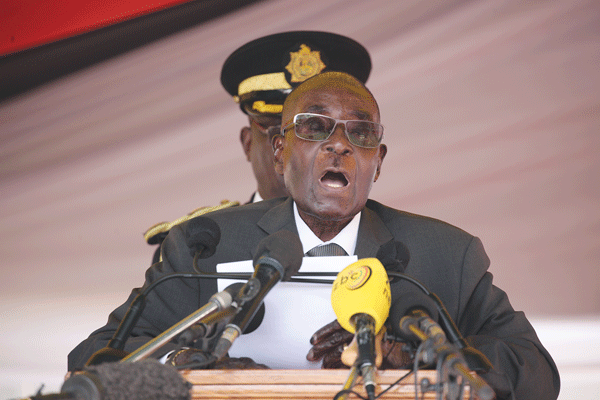
While in Durban recently, President Robert Mugabe was quoted saying Zimbabwe was one of the most developed countries in Africa after South Africa. That was not only surprising but contradictory especially after he had, a few months ago, declared that the infrastructure such as roads was in a state of emergency.
Develop me: Tapiwa Gomo

He backed his case by stating, among others, that Zimbabwe has the highest literacy rate in Africa, a point that has been his source of pride over the years.
This point has lacked analysis on why his government has historically invested so much into education and yet the same government has failed to create a conducive environment that enables the same educated people to secure employment or invest in their country.
The love for power and politics has demonised our country. We have allowed politics to dominate every aspect of our lives and to the detriment of the everything else. And those, who have remained in power have used every trick and resource to ensure that they stay in power, even when it is no longer productive to the nation. And because politics has been the bane of our time, the country has experienced a huge brain and resource drain.
The outflow of our resources, including financial resources, has been spiking exponentially, robbing the country of liquidity and stable cash flows.
Even some in government do not trust themselves and their system to look after their own resources and they also keep their money in offshore accounts. And those hustling in small scale businesses have preferred to either open bank accounts outside the country or keep it in their houses.
Capital is scared of dirty politics, especially when that is combined with a colossal deficit of trust. Our banks have become empty halls of just numbers surrounded by long queues of people desperate to access their cash.
- Chamisa under fire over US$120K donation
- Mavhunga puts DeMbare into Chibuku quarterfinals
- Pension funds bet on Cabora Bassa oilfields
- Councils defy govt fire tender directive
Keep Reading
Those in the diaspora no longer prefer to send money through transfer agencies if cash is inaccessible. Another informal money market may sprout soon if this continues. And it is the poor who suffer.
Despite possessing an abundance of resources, the country now survives on imports and the little cash that remains in the system is taken out of the country to buy basic stuff which the country is supposed to produce.
We have become a consumer society and not anymore the productive one. No one trusts the environment, including those who are supposed to restore confidence and trust.
Outward migration rates have been on the increase since year 2000, when the economy began to wilt at the whims of the politics. The actual numbers of people who have left the country remains uncertain, but there is no doubt that they are in their millions.
Most of these are highly qualified professionals, who are supposed to be part of the engine that drives the economy. It has become every young child’s dream to leave the country once they complete their education.
In addition to the mineral and financial leakages, Zimbabwe has immensely lost in terms of human capital. I recently attended a social gathering by Zimbabweans in one east African country.
These are highly qualified people who could have been contributing to their country’s growth if the situation allowed them to do so.
There is no doubt that Zimbabweans in the diaspora love their country and they wish for a day when there is change. But there is also a challenge.
The longer they stay outside, the deeper their roots will grow in those countries which will make it harder for them to uproot themselves and trek back home when things change.
The recent utterances, reportedly by the Registrar-General Tobaiwa Mudede that the government will not re-align the Citizenship Act with the Constitution to allow dual citizenship demonstrates how misplaced our priorities are.
The reasons cited for the government’s intention to abolish dual citizenship include security, tax evasion, human trafficking and others. These reasons are both selfish and counterproductive and some of them are effects of a bad economy. Since elections are around the corner, this may be an excuse to deny those in the diaspora their right to vote.
I doubt that the Registrar General’s view is in tandem with other government policies. In December 2014, Vice President, Emmerson Mnangagwa announced some policy changes to make it easier for foreign investors and while here we see a new policy that is counterproductive and discouraging Zimbabweans in the diaspora to be the first to invest in their country.
Luke Ngwerume, the chief executive officer of ZimSelector was quoted in this paper in January this year, urging the government to encourage internal savings because foreign direct investment does not guarantee that it will stay in an economy.
The more than a billion dollar annual contribution by the diaspora can be part of the starting point for internal savings only if Mudede decides to see the bigger picture.
Tapiwa Gomo is a development consultant based in Pretoria, South Africa











